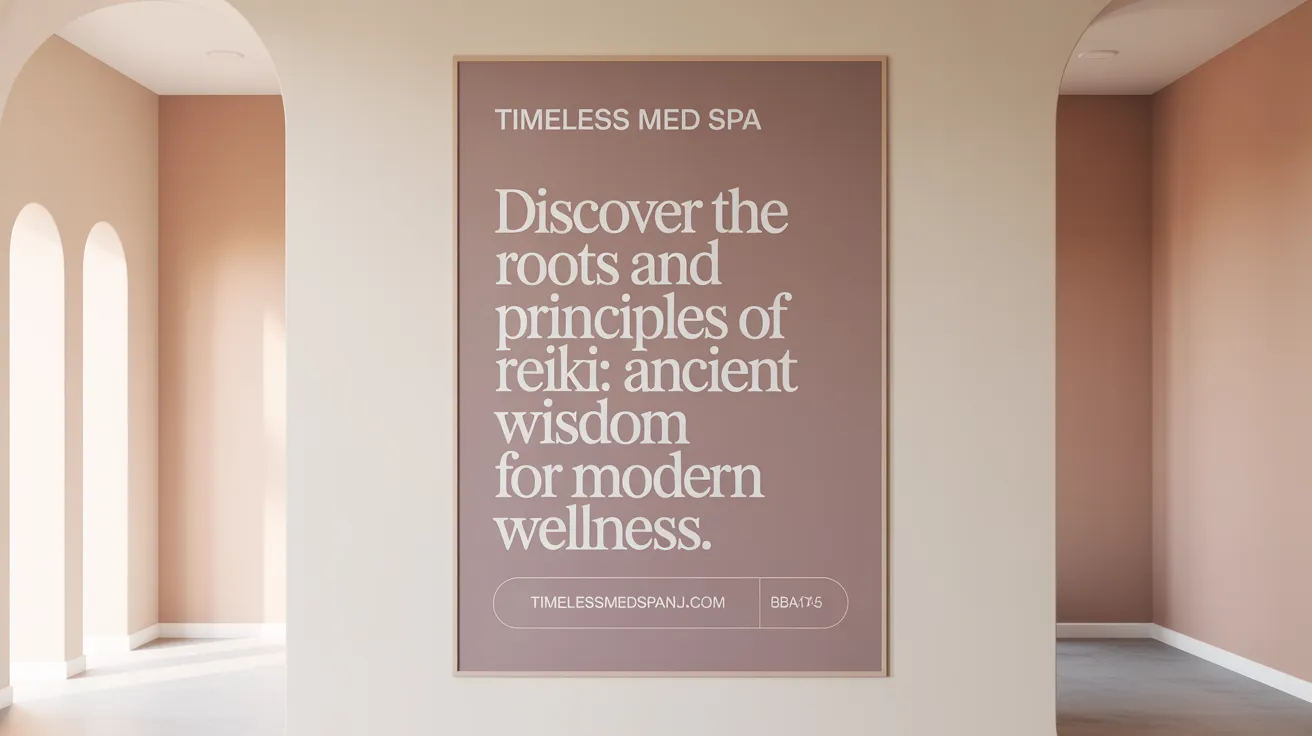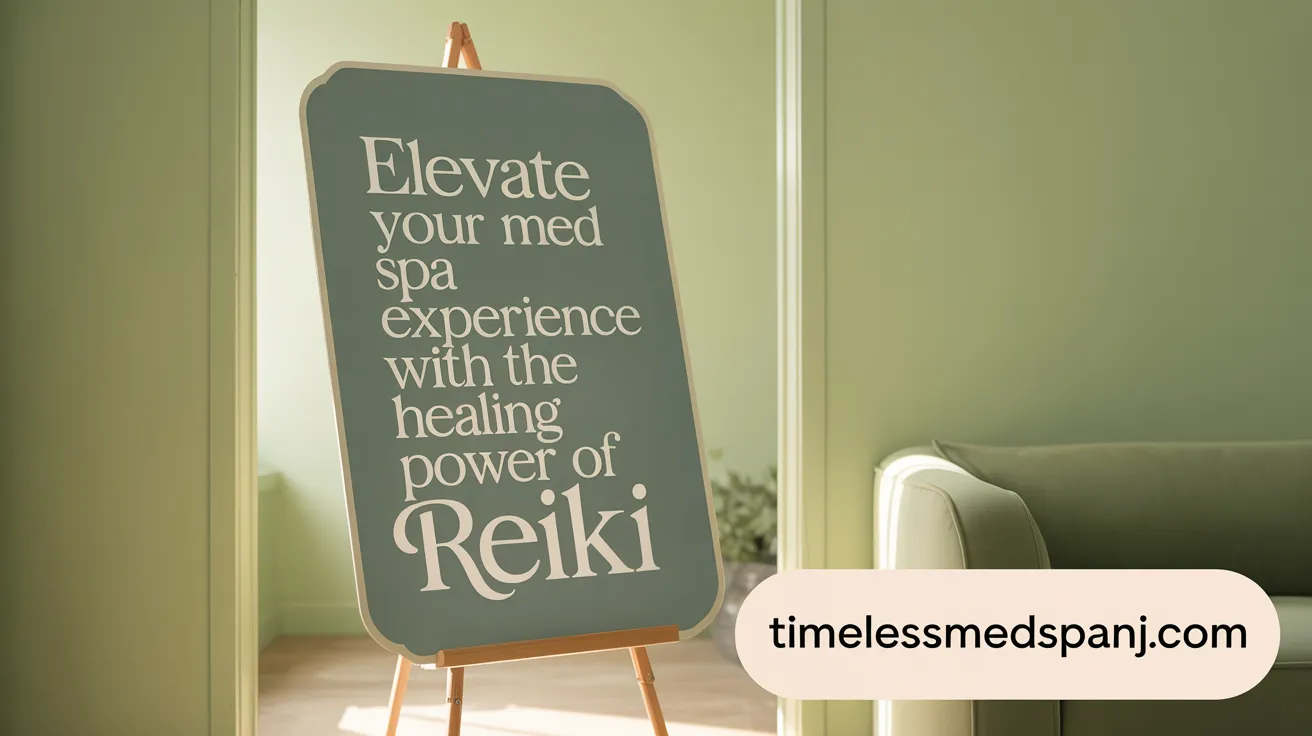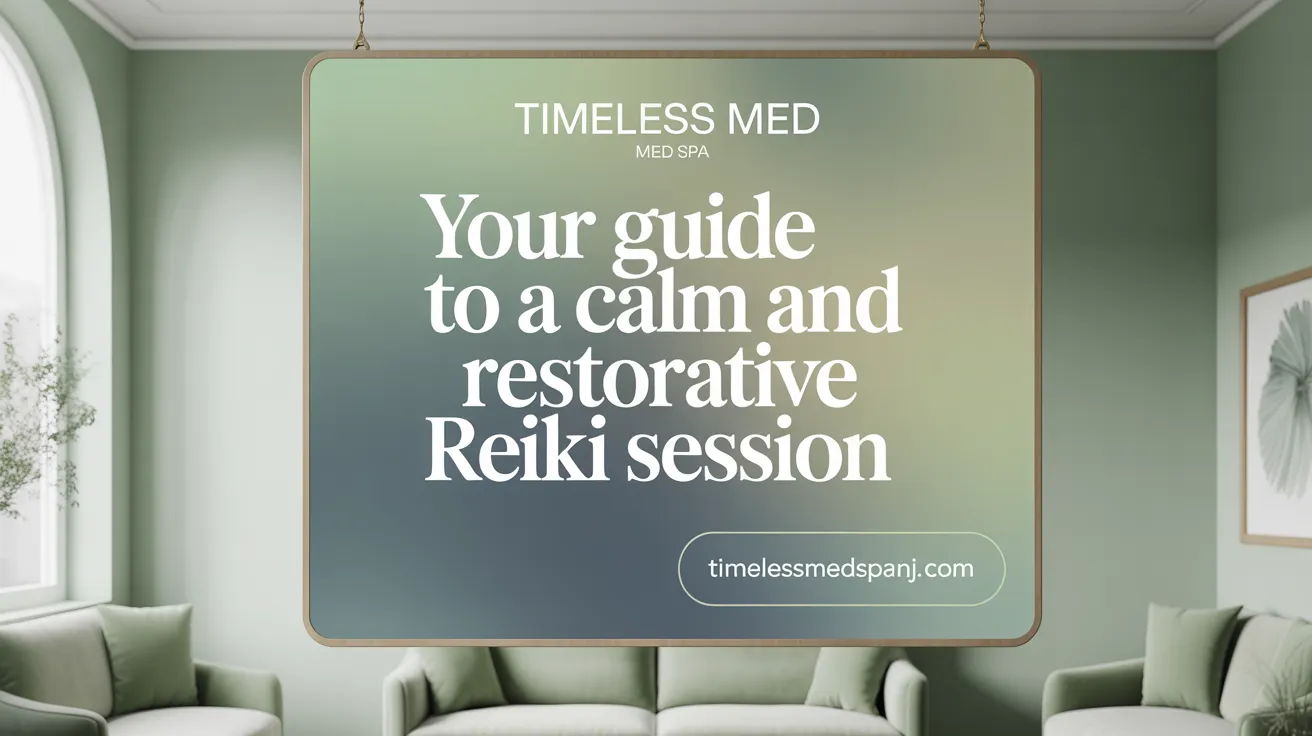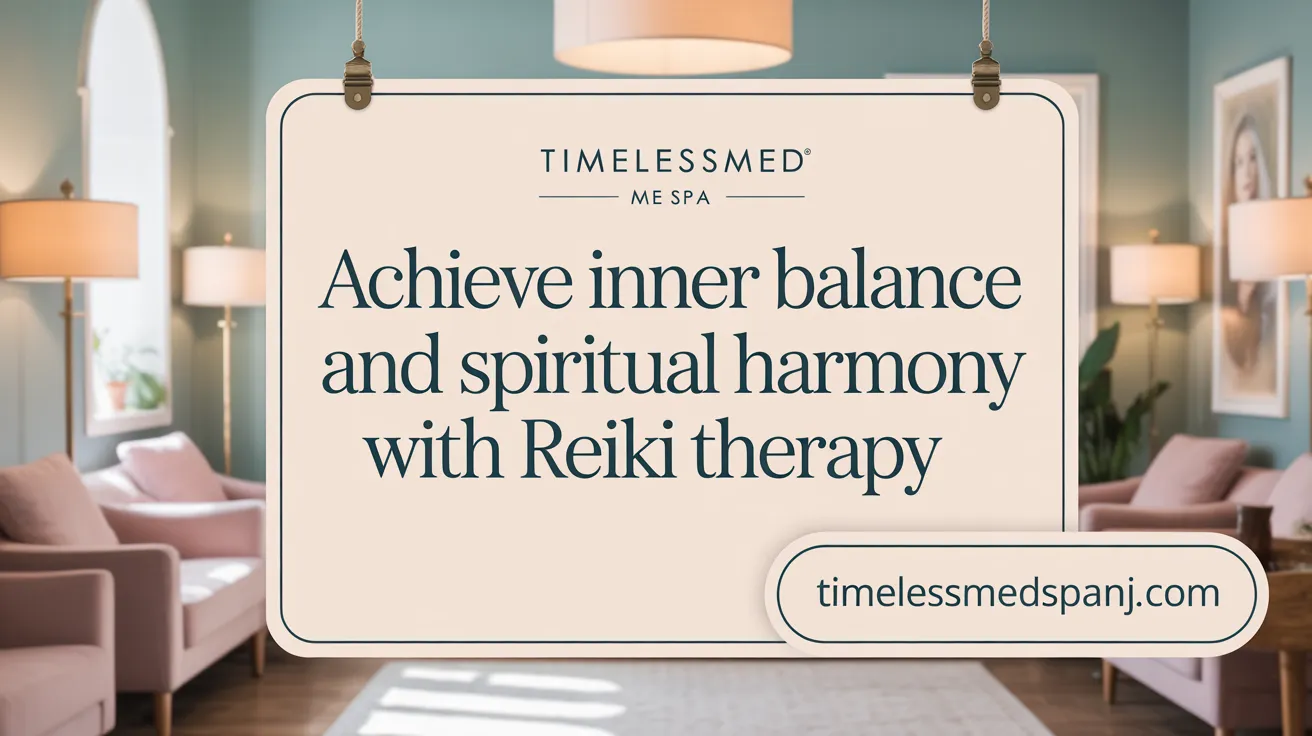Bridging Ancient Energy Healing and Modern Med Spa Treatments
As med spas increasingly embrace holistic approaches, Reiki therapy emerges as a serene complement that harmonizes traditional beauty treatments with energy healing. Rooted in ancient Japanese tradition, Reiki offers med spa clients a pathway to deeper relaxation, emotional balance, and spiritual well-being. This article explores how Reiki therapy enhances your med spa experience by integrating mind, body, and spirit into your self-care routine, supporting not only outer beauty but also inner harmony and health.
Understanding Reiki Therapy: Origins and Principles

What is Reiki therapy and what are its fundamental principles?
Reiki therapy is an age-old Japanese healing practice that focuses on channeling universal life force energy to foster overall well-being. Rooted in the concepts of Rei (spiritual wisdom) and Ki (life energy), it involves a trained practitioner guiding energy through gentle hand placements or hovering hands around the recipient.
The core belief is that this energy helps to balance and unblock the body's natural energy pathways. When these pathways are clear and flowing, the body’s innate ability to heal itself is supported. Reiki aims to promote relaxation, reduce stress, and support emotional and physical health by restoring energetic harmony.
Practitioners often work with principles like compassion, gratitude, and harmony. They believe that energetic blockages—caused by stress, emotional trauma, or physical injuries—can manifest as illness. By clearing these blockages, Reiki seeks to activate the body's self-healing capacities.
This therapy can be delivered in person through gentle touch or hands-over-body techniques, as well as remotely via distance healing sessions. Many people experience feelings of warmth, tingling, or pulsation during the process, and often report feeling more relaxed and balanced afterward.
While many users find Reiki beneficial for relaxation and emotional release, it is important to note that scientific research supporting its efficacy is limited. It is best viewed as a complementary treatment to conventional medicine, enhancing overall wellness rather than replacing medical care.
Additional insights
Reiki originated in Japan centuries ago, inspired by traditional Japanese healing practices. Its principles align with other Eastern philosophies involving life-force energy, including Chinese qi and Indian prana. Despite its broad popularity and spiritual significance, scientific validation remains scarce, and it is mainly valued for its soothing, supportive qualities in holistic health.
For those interested in exploring its principles further, searches using terms like "History and principles of Reiki therapy" can provide deeper historical and cultural insights into this gentle healing art.
Holistic Health Benefits of Reiki Therapy

What are the benefits of Reiki therapy for holistic health and wellness?
Reiki therapy provides a gentle, non-invasive approach to improving overall well-being. It is known for helping reduce stress and anxiety, which can lead to a calmer mind and a more balanced emotional state.
Many people report feeling more relaxed and centered after a session. This relaxation promotes mental clarity and emotional healing, supporting a broader sense of mental balance.
Reiki also aims to alleviate physical discomforts such as pain and fatigue. Patients undergoing treatment for chronic conditions or recovering from surgery often notice improvements in their symptoms.
Besides physical relief, Reiki can improve sleep quality and boost energy levels. Regular practice helps clear energetic blockages, revitalizing the body's natural energy flow.
On a deeper level, Reiki is valued for its role in spiritual growth and personal development. It encourages self-awareness, emotional release, and inner harmony.
As a complementary wellness practice, Reiki is safe to use alongside conventional medical treatments. It supports the body’s innate healing abilities and enhances overall health.
While it lacks conclusive scientific validation, many individuals experience emotional clarity, increased vitality, and subjective symptom relief through ongoing Reiki sessions.
| Benefits | Focus Areas | Additional Notes |
|---|---|---|
| Stress and anxiety reduction | Emotional wellness | Promotes relaxation and mental calmness |
| Pain relief and fatigue | Physical health | Supports recovery and comfort |
| Better sleep and energy | Sleep and vitality | Restores vitality and reduces exhaustion |
| Emotional and spiritual growth | Inner development | Fosters self-awareness and spiritual alignment |
| Support as a complementary therapy | Overall health | Enhances effects when combined with medical care |
In summary, Reiki serves as a holistic approach to wellness, nurturing the mind, body, and spirit—helping individuals lead healthier, more balanced lives.
Enhancing Med Spa Treatments Through Reiki Integration

How does Reiki therapy complement and enhance med spa or aesthetic treatments?
Reiki therapy offers a gentle, non-invasive approach that beautifully complements traditional med spa and skincare procedures. By channeling universal life force energy, Reiki promotes deep relaxation, emotional balance, and overall well-being. When integrated with treatments like facials, massages, or crystal healing, it helps soothe the nervous system, reduce stress, and activate the body's natural healing mechanisms.
This holistic approach can lead to quicker recovery times, improved skin health, and enhanced treatment outcomes. Clients often find that combining Reiki with aesthetic services not only elevates the physical results but also adds a layer of emotional and spiritual wellness.
Offering energy healing during or alongside skincare treatments allows practitioners to address both outer beauty and inner balance. Many clients appreciate the comprehensive experience, which turns a simple treatment into a wellness journey. This fusion of energy healing and aesthetic care provides a competitive edge, appealing to those seeking holistic self-care solutions.
In summary, Reiki enhances med spa treatments by fostering harmony within the body, supporting natural healing, and ultimately optimizing the efficacy of traditional aesthetic procedures. This integrated approach can set your spa apart, attracting clients who value a deeper, more meaningful wellness experience.
What to Expect During a Reiki Session: A Step-by-Step Guide

Typical session environment and client positioning
A Reiki session usually takes place in a peaceful, calming environment, often softly lit and quiet to promote relaxation. Clients remain fully clothed and lie comfortably on a massage table or sit in a reclined position. The setting is designed to make clients feel safe and at ease, facilitating the flow of energy.
Practitioner hand placements and techniques
During the session, the practitioner gently places their hands lightly on or slightly above specific areas of the body, such as the head, shoulders, chest, abdomen, arms, legs, and feet. This technique involves soft touch or hovering hands, aiming to channel universal life energy to the client. Some practitioners may follow a set protocol, while others personalize according to individual needs. The goal is to clear energy blockages, promote balance, and encourage the body's self-healing.
Sensations clients may experience
Clients often experience various sensations, including warmth, coolness, tingling, pulsations, or feelings of deep relaxation. Some may feel emotional releases or see visual imagery, while others might not feel anything specific at all. These sensations can vary between sessions and individuals, contributing to the relaxing and healing atmosphere.
Session duration and atmosphere
Most Reiki sessions last between 45 and 60 minutes. The atmosphere encourages tranquility, often accompanied by soothing music or complete silence. The setting emphasizes serenity and mental ease, helping clients disconnect from everyday stress and focus on their inner experience.
Post-session feelings and effects
After a session, many clients report feeling calmer, more centered, and emotionally lighter. Some experience a gentle energy boost and enhanced mental clarity. Others may notice a temporary sense of fatigue or emotional release as part of the healing process. It is common for clients to feel a renewed sense of well-being and relaxation that can last for days.
| Aspect | Details | Additional Notes |
|---|---|---|
| Environment | Quiet, peaceful, comfortably lit | Soft music or silence |
| Client positioning | Fully clothed, lying or sitting | On table or chair |
| Techniques used | Light touch, hands hovering | Sequence varies per practitioner |
| Sensory experiences | Warmth, tingling, relaxation | Varies individually |
| Typical duration | 45-60 minutes | Customizable based on needs |
| Post-session feelings | Relaxation, clarity, emotional release | Effects may last days |
Promoting Relaxation, Emotional, and Spiritual Well-Being Through Reiki

How does Reiki therapy aid in calming the nervous system?
Reiki therapy is widely appreciated for its ability to induce deep relaxation by activating the body's parasympathetic nervous system. When practitioners use gentle touch or hover their hands over specific areas, they help clear blockages and promote energy flow. This process encourages a state of calmness, reducing stress and lowering cortisol levels, which are associated with fight-or-flight responses.
How does Reiki support emotional clarity and release?
Clients often report feeling emotionally lighter and more centered after a session. Reiki helps facilitate the release of emotional tension embedded in the body's energy fields. By balancing these energies, individuals can experience emotional clarity, reduced anxiety, and a greater sense of inner peace. This holistic approach promotes emotional resilience, especially in times of stress or trauma.
What role does Reiki play in spiritual alignment and energy balance?
Reiki is rooted in the concept of universal life force energy—'Rei' and 'Ki'—which, although not scientifically proven, is believed by practitioners to support spiritual healing and inner harmony. Through the channeling of positive energy, Reiki helps align the body’s spiritual and emotional aspects, fostering a sense of connectedness and purpose. Many clients find that Reiki deepens their spiritual awareness and improves their sense of well-being.
What are the research findings on parasympathetic activation?
Scientific studies suggest that Reiki may stimulate the parasympathetic nervous system, responsible for rest, digestion, and recuperation. Although research is limited and often subjective, some evidence points to positive effects such as increased relaxation, reduced inflammation, and enhanced immune function. Such activation is beneficial for overall health, especially for those dealing with chronic stress or illness.
How does Reiki contribute to chronic illness management?
While it is not a cure, Reiki supports individuals with chronic conditions by alleviating symptoms like pain and fatigue, improving sleep quality, and boosting emotional well-being. Many patients use Reiki as a complementary therapy alongside conventional treatments, finding it aids in emotional resilience and enhances overall quality of life.
| Aspect | Benefits | Additional Notes |
|---|---|---|
| Relaxation | Deep calm, lower stress | Encourages parasympathetic activation |
| Emotional Health | Clarity, release of tension | Helps manage anxiety and emotional distress |
| Spiritual Well-Being | Inner harmony, connection | Supports spiritual growth and healing |
| Chronic Illness | Symptom relief, resilience | Used as a complement to standard medicine |
Reiki offers a gentle, holistic approach that aligns physical, emotional, and spiritual health. While scientific proof remains limited, many people find value in its relaxing and balancing effects, especially when used alongside evidence-based medical treatments.
Scientific Perspectives and Misconceptions of Reiki Therapy
What are common misconceptions about Reiki and what does scientific research say about its effectiveness?
Many people believe that Reiki is a purely spiritual practice with mystical powers, often assuming it can directly cure medical conditions. Some think it involves transferring a tangible energy that can be measured scientifically. However, these ideas are misconceptions. Reiki is a Japanese healing technique that channels what practitioners describe as universal life force energy through hand placements or hovering hands.
From a scientific viewpoint, there is no measurable energy field or physical mechanism to support the energy transfer claims of Reiki. Research on Reiki is limited and often flawed, with many studies relying on subjective reports and small sample sizes. While some participants report feeling calmer, less stressed, or experiencing pain relief, these results are often attributed to relaxation and placebo effects rather than any specific energy transfer.
Certain physiological markers, such as reduced heart rate and increased parasympathetic nervous system activity, suggest that Reiki can promote relaxation. Nonetheless, this does not confirm that Reiki has direct healing properties. It is widely acknowledged within the scientific community that the therapeutic potential of Reiki is primarily tied to the placebo response.
Reiki’s Integral Role in Holistic and Aesthetic Wellness Practices
Reiki is widely valued in wellness and aesthetic practices for its ability to support a holistic approach to health. As a gentle, non-invasive therapy, it promotes harmony within the mind, body, and spirit by channeling universal life force energy through light touch or hovering hands. Practitioners aim to clear energy blockages, encourage relaxation, and enhance natural healing, contributing to a sense of overall well-being.
In integrating with other holistic modalities such as acupuncture, massage, yoga, and meditation, Reiki offers a complementary pathway to deepen relaxation and emotional balance. It can be seamlessly incorporated into beauty and wellness routines to foster a mindful self-care experience, promoting not only physical beauty but inner harmony.
Reiki helps individuals recover from stress, emotional fatigue, and physical discomfort, supporting their natural resilience. It is especially beneficial in aesthetic settings for calming the nervous system, reducing anxiety, and improving aura vitality—factors that contribute to healthier skin, a brighter complexion, and an improved sense of self-esteem.
Because of its safety and non-invasive nature, Reiki is accessible to all ages and health conditions. It complements traditional treatments and enhances the effectiveness of other therapies by fostering a peaceful mental state, which is integral to holistic health.
| Aspects | Benefits | Additional Notes |
|---|---|---|
| Holistic healing | Supports physical, emotional, and spiritual balance | Used alongside massage, meditation, and aesthetic procedures |
| Integration with other modalities | Deepens relaxation, aids recovery, enhances beauty routines | Often combined with acupuncture, yoga, or skincare treatments |
| Support for natural recovery | Promotes self-healing, reduces stress, calms the nervous system | Applicable during post-treatment or healing phases |
| Safe, non-invasive | Suitable for all ages, no side effects | Reinforces the body's natural resilience |
| Overall wellness | Enhances mood, emotional stability, and mental clarity | Assists in achieving inner balance and emotional well-being |
This approach makes Reiki a valuable component of a comprehensive wellness strategy, aligning with goals to foster overall health, aesthetic beauty, and spiritual harmony. Its role in supporting natural recovery and emotional stability underscores its significance in the broader landscape of holistic and aesthetic health practices.
Embracing Reiki for a Holistic Med Spa Experience
Reiki therapy offers a gentle yet profound addition to med spa services by bridging ancient energy healing with modern wellness practices. It enhances relaxation, emotional well-being, and spiritual clarity while complementing traditional aesthetic treatments, ultimately creating a more comprehensive and personalized client experience. Though scientific validation remains limited, Reiki's value lies in its ability to foster balance and harmony across the mind, body, and spirit. Integrating Reiki into your med spa journey invites a holistic approach to self-care that honors the interconnectedness of health and beauty, empowering you to nurture not only your external radiance but also your inner vitality and peace.
References
- How Reiki Works for Achieving Holistic Wellness
- Reiki: How Energy Healing Works
- Reiki & Acupuncture with the NADA Protocol
- Reiki Energy Healing in Tampa | Health Therapy Spa
- Reiki Treatment Dyer - BeYou Med Spa & Wellness
- Reiki Massage Treatments at our Sedona spa
- Reiki Therapy - Restorative Energy Healing
